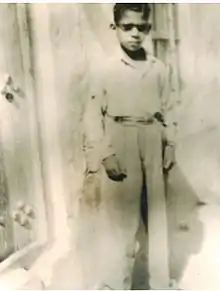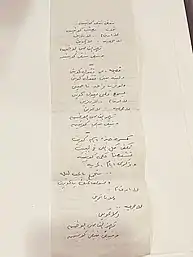Fayeq Abdul-Jaleel
Fayeq Mohammed Al-Ayadhi (Arabic: فائق محمد علي العياضي) (born May 5, 1948), better known by his pen name Fayeq Abdul-Jaleel (Arabic: فائق عبدالجليل), was a prominent Kuwaiti poet, playwright and lyricist whose work was well known throughout the Arab world. He was captured by Iraqi forces during the invasion of Kuwait in 1990 and he was the best known of more than 600 Kuwaiti civilians who were held as prisoners of war by Saddam Hussein's government. He was never seen by his family or friends again until his remains were unearthed in the Iraqi desert in 2004. The timing and manner of his death is a matter of some enduring mystery.
Fayeq Mohammed Ali Al-Ayadhi | |
|---|---|
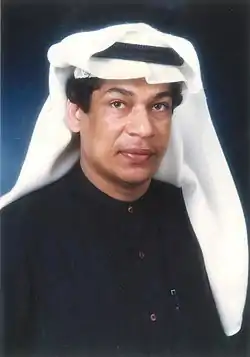 Pen Name: Fayeq Abdul-Jaleel | |
| Born | Fayeq Mohammed Ali Al-Ayadhi May 5, 1948 |
| Died | Unknown, missing January 3, 1991 (aged 42) and declared dead June 18, 2006 (aged 58) His remains were found in a mass grave in Iraq desert, West of Karbala city. |
| Cause of death | Executed – Bullet wound to the head |
| Resting place | Kuwait, Al-Sulaibikat cemetery |
| Nationality | Kuwait |
| Occupation | Poet |
| Years active | 1964–1990 |
| Signature | |
 | |
Life and work
Fayeq Abdul-Jaleel was born in Kuwait City and started out as a painter before coming to prominence at the age of 19 with a collection of poems entitled Wasmiah and the Stalks of Childhood (1967).[1] He went on to publish several more books of verse and also penned the lyrics to several songs that became popular in the Arab world, collaborating with singers including Mohammed Abdu (Abaad, Layla, Layla, Filjaw Ghaim), Talal Maddah and Abu Baker Salem, and many well known singers. He also wrote several plays performed in his homeland, including Kuwait's first puppet play (1974), and was active in the administration of Kuwait's national theater company. His signature style was to write in an Arabic somewhere between the formalism of the classical language and the regionally tinged spoken vernacular. He saw poetry as political, something that could act as an engine of social change. "Poetry," he wrote in a verse from 1968, "is one grain of wheat which enters all ovens and bakeries to feed all the people." His poetry also reflected a deep attachment to Kuwait itself and a sense of foreboding about his own ultimate fate – earning him comparisons to the great Spanish Civil War-era poet Federico Garcia Lorca.[2][3]
To earn a living, Abdul-Jaleel worked for the municipality of Kuwait City and also acted as an advocate for the arts for the Kuwaiti Information Ministry, traveling extensively throughout the Arab world. He also ran his own advertising agency. He married his cousin Salma Al-Abdi in 1967 and had five children: Gadah (born 1971), Fares (1972), Raja (1978), Sara (1983) and Nouf (1985).
The Iraqi invasion of Kuwait
When Iraqi forces unexpectedly overran Kuwait on August 2, 1990, Abdul-Jaleel was caught in Kuwait City with his wife and four-year-old daughter Nouf. He embarked on a high-risk adventure to drive his wife and child to the desert border with Saudi Arabia, but chose not to leave with them, telling his wife he wanted to put a few affairs in order before joining the family overseas. In the end, he could not bear to leave – as he ended up explaining in a letter to his loved ones that was recovered after the end of the 1991 Gulf War from the family's kitchen table.[6] Rather, he joined a loose civilian resistance movement as poet along with a handful of fellow musicians and friends. Together, they wrote and recorded poems and music intended to embolden the Kuwaiti population against the invaders.[7] They had a whole system in place, involving a network of women who hid the cassettes they recorded in the fold of abayahs and distributed them from house to house.
They were, however, victims of their own success. Kuwaitis talked so much about the poems and songs that the Iraqis got wind of them, worked out who was responsible and, on January 3, 1991, arrested the lot of them.
Poem we stay Kuwaiti[8]
We stay Kuwaiti
We stay .... We stay Kuwaiti
We die and live as Kuwaiti
No numbers, no benzene
No society .... No supply
To shake the patriotic people
And we stay .... We stay Kuwaiti
November – 1990
His last letter to his wife
Dear mother of Fares,
Greetings.. Love.. Appreciation.. For you and the children..

I hope you are steadfast in exile, as I am steadfast at home.
Today, Friday, the time is four oclock in the morning, the place is
my bedroom, and under the light of the lampshades that constantly
stick to my head.
I promised you that I would leave Kuwait Thursday. I went and sat browsing through my
thoughts that multiply and then become one idea. Which is the idea of steadfastness ...
I discovered that staying in Kuwait gives me immunity, strength and toughness, and my
staying here does not mean that I do not need you. I need you most.. But Kuwait
desperately needs me..
Do your national duty in exile to the fullest. And do what you can offer with your Kuwaiti
brothers. Until the hour of joy.[9]
The journey of efforts to release the poet and the Kuwaiti prisoners


After the liberation of Kuwait, the State of Kuwait carried out international endeavors at a high level of representation headed by the Emir of Kuwait, Sheikh / Jaber Al-Ahmad Al-Sabah, who accompanied in his international trips Sarah, the daughter of the captive poet at that time, to read a letter asking the kings and heads of those countries to help release the Kuwaiti prisoners in Iraq, including her poet father.[10]
A letter written by the poet from the prison
In 2000, the Kuwaiti authorities found an ambiguous letter in the handwriting of the poet Fayeq Abdul-Jaleel, which was received by a Mauritanian novelist, who was invited to a cultural conference in Iraq. An unknown person (believed to be one of the security elements attached to the Special Security Agency of Qusay Saddam Hussein) came to her carrying that message to her for the purpose of delivering it to the Kuwaiti diplomatic mission in the Mauritanian capital (Nouakchott). The details of that story were mentioned in a television interview with the official concerned with the issue of Kuwaiti prisoners at the Ministry of Interior at that time.[11]
Message text:
I am the poet Fayeq Abdul -Jaleel, I am in Basra, but I do not know the place or the time. I forgot to write, read, poetry, birds and children
My regards to Raja, Fares and the girls... Is mother of Fares present?
I was sick and the Iraqi authorities treated me well, but I feel alienated, lonely and disappointed
Send news to Kuwait?
Send news to Nizar Qabbani.. I have largely forgotten poetry.. I am here, but where am I?
I wrote these letters with the help of this Mauritanian woman whose name I cannot mention. Send me the news of everything
I'm Fayeq .. I'm Fayeq .. I'm Fayeq
Is Raja present? Is Fares present?
Is Kuwait still Kuwait or not?
Workers inspired by his poems
Many people were inspired by Fayeq Abdul-Jaleel's poems and songs here are some examples:
1- In fact, (Deira Opera.. We stay Kuwaitis)[12] was the first Kuwaiti opera song that expressed Abdul-Jaleel's extreme love for his country it was inspired by poem he wrote during the Iraqi occupation of Kuwait called (We stay Kuwaiti) and it was produced under the patronage of His Highness Sheikh Sabah Al-Ahmad Al-Jaber Al- Sabah, the Emir of Kuwait. This opera was produced and presented at the Amiri Diwan by the Martyr's Office in 2015,[13] many years after Abdul-Jaleel was imprisoned and murdered.[14][15]
2- In 2000 musical score was written by Dr. Suleiman Al-Degan in. This music was inspired by the poem titled (Restoring Life),[16] which was a part of the Diwan (Story of My Silence).
Honoring the poet

1. Honoring on the Arab Theater Day to honor the theater artist - Kuwait in 1977 under the patronage of Sheikh Salem Sabah Al-Salem Al-Sabah.
2. Honor from the Kuwaiti Theater Troupe in 2003 - for a course in enriching the Kuwaiti theatrical movement.
3. Honor from the National Conference (from Kuwait we start and to Kuwait we finish) - session 10 - 2013.
4. Honoring from the 21st Qurain Cultural Festival under the auspices of the National Council for Culture, Arts and Letters - Kuwait 2015.
Imprisonment and death
The fate of the Kuwaiti prisoners has never been determined with any precision. The US government now believes they were probably all executed shortly after the end of the Gulf War. But that was not the US position before the 2003 invasion of Iraq; in fact, the return of the prisoners was cited as a secondary reason for launching the invasion in the first place. Throughout the 1990s, the Arab-language media reported occasional sightings of Abdul-Jaleel and other prisoners in one location or another.[17]
His remains were unearthed from a shallow mass grave in the desert near Kerbala in July 2004. He was identified by the intact label inside his traditional Kuwaiti robe, showing the name of his tailor.[18] and by a series of DNA tests. According to his death certificate, issued by the Kuwaiti Health Ministry in June 2006, he had been dead for more than 10 years at the time his remains were discovered. However, the DNA test, conducted by the Interior Ministry and obtained by Abdul-Jaleel's family, suggested the remains were of a man in his early fifties – the age he would have been around the time of the 2003 invasion.
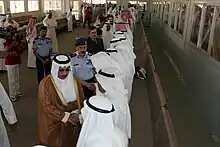
Abdul-Jaleel's son, Fares Al-Ayadhi, has conducted numerous interviews with people who claim to have seen his father down the years, including an indirect contact with a man who says he was the commander at a prison outside Basra where Al-Ayadhi was held. The younger Al-Ayadhi's information, which has neither been confirmed nor refuted by the Kuwaiti authorities, suggests that Abdul-Jaleel and a number of other prisoners deemed to be of high value to Saddam's government were kept alive for several years.
Al-Ayadhi believes his father was held first in Mosul, then in the Baghdad area and finally in the prison near Basra. According to the man Fares Al-Ayadhi believes to have been his father's last prison commander, he and the other surviving Kuwaiti prisoners of war were sentenced to death shortly before the start of the US invasion in March 2003, driven into the desert and shot.[19]
Abdul-Jaleel's body was brought back to Kuwait where he was buried on June 20, 2006, in Kuwait City's Sulaibikhat Cemetery. The ceremony was attended by the deputy prime minister, defence minister, acting interior minister and several other government dignitaries.[20]
Poet's eulogy
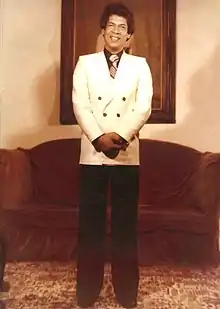
On June 20, 2006, Kuwait officially announced the martyrdom of Fayeq Abdul-Jaleel, when the Kuwaiti Minister of Information at the time,
Mohammed Nasser Al-Sanousi, the martyr poet, declared:[21]
((Verily, Fayeq Abdul-Jaleel has never been absent from us and has not disappeared from our minds and hearts. He is a spot of light that takes its place next to the radiant light bouquets that represent our martyrs. He added that the martyr poet is a wonderful and great national symbol in which we pride ourselves through time among peoples and Nations)).
References
- Archived October 1, 2011, at the Wayback Machine
- "الأرشيف". www.aawsat.com. Archived from the original on September 10, 2012. Retrieved November 10, 2010.
- "Archived copy". Archived from the original on July 22, 2011. Retrieved April 29, 2010.
{{cite web}}: CS1 maint: archived copy as title (link) - ""نموت.. نعيش.. كويتيين"". العربية (in Arabic). August 16, 2016. Retrieved March 3, 2022.
- "نبقى.. نبقى كويتيين". النشرة الدولية - Alnashra Aaldawlia - International Daily bulletin (in Arabic). August 2, 2021. Retrieved March 3, 2022.
- "فائق عبد الجليل.. عاشق الوطن ورجل "المعادلة الصعبة"". Aawsat.com. Archived from the original on March 4, 2012. Retrieved June 22, 2018.
- Video on YouTube
- قصة نبقى, retrieved March 3, 2022
- "فائق عبد الجليل "الشرق الأوسط" حقائق عن أشهر أسير كويتي:,". archive.aawsat.com. Retrieved March 3, 2022.
- ""القبس" تنشر الوثائق البريطانية عن الغزو (1)". جريدة القبس. Retrieved March 3, 2022.
- لقاء اللواء المتقاعد فيصل الجزاف في برنامج (ليالي الكويت) عن ملف الأسرى و المفقودين, retrieved March 21, 2022
- Deira Opera.. We stay Kuwaitis, retrieved March 21, 2022
- "كونا : (أوبرا ديرة..ونبقى كويتيين) عمل أوبرالي كويتي تغنى بحب الوطن - احتفالات - 23/02/2015". www.kuna.net.kw. Retrieved March 21, 2022.
- "Deira Opera". Kuwait Martyr Bureau (in Arabic). October 1, 2015. Retrieved March 21, 2022.
- "أوبرا ديرة نبقى كويتيين إنجاز تاريخي فني يؤكد ريادة درة الخليج". www.alanba.com.kw (in Arabic). Retrieved March 21, 2022.
- 04 Rud Al Hayat sulaiman aldikan سليمان الديكان, retrieved March 21, 2022
- "الوضوح مفتاح أزمات العراق - عبد الرحمن الراشد". www.aawsat.com. Archived from the original on March 4, 2012. Retrieved April 29, 2010.
- "رسالتان أفرحتا الكويت وآلمتاه بعد فقدانه..وصدام حسين تابع ملفه شخصيا..!!".
- "زوجة فائق عبد الجليل تكشف لأول مرة لـ "الشرق الأوسط" حقائق عن أشهر أسير كويتي:,". www.aawsat.com. Archived from the original on March 4, 2012. Retrieved April 29, 2010.
- "كونا : حدث في مثل هذا اليوم في الكويت - عام - 19/06/2021". www.kuna.net.kw. Retrieved March 21, 2022.
- "كونا : وزير الاعلام يؤبن الشاعر الشهيد فائق عبدالجليل - الإعلام - 21/06/2006". www.kuna.net.kw. Retrieved March 3, 2022.
